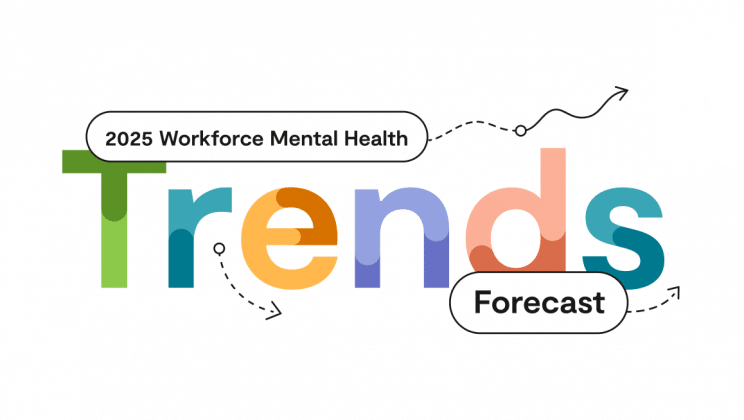Transforming Care for Complex Mental Health Needs
September 10, 2024
Imagine a loved one suffering from a complex mental health issue. It usually takes weeks to find them the right level of care and months to get admitted into a specialized program. They eventually get admitted to the only local residential treatment center taking new patients, even though they might be better suited for an intensive outpatient program setting at a fraction of the cost.
This is the stark reality for many individuals and the family members who support them.
As an addiction psychiatrist working in government, university, and policy settings over the last decade, I have seen so many individuals fight through health systems to get quality care and remain well. Nearly 1 in 20 adults in the United States have a serious mental health diagnosis such as an eating disorder, severe depression, suicidality, or substance use disorder, and that number has grown by nearly 40% in recent years.
The challenges of having a complex mental health issue are deep and pervasive. It can be hard to go to work, attend school, or live your life. Some patients I’ve worked with are lucky and have a loved one who makes it their full-time job to manage the recovery. This is a lot to ask of someone who is not an expert and needs to also care for themselves, given the impact of the stress. This effect can also extend to the workplace, where the economic toll of complex mental health needs alone is $300 billion annually.

It always pains me to see the struggle my patients and their caregivers endure as they try to get into a program. It's a challenging ecosystem where most programs aren't accepting new patients. The programs that are accepting new patients frequently are out of network and prohibitively expensive. Worse, care isn’t coordinated and individuals don’t get the support they need to truly achieve wellness in the long term. Furthermore, many facilities don’t deliver evidence-based treatments or assist in transitioning into step-down levels of care that are imperative for long-term recovery. Unsurprisingly, roughly 1 in 3 patients end up readmitted to a facility within a year.

At Lyra Health, we believe everyone deserves access to life-changing care—the type of care we'd expect for our closest friends and family. Since 2021, we've helped connect members to higher levels of care, such as inpatient care, residential treatment centers, and intensive outpatient programs. After three years of supporting members with the most acute needs, we're excited to launch Lyra Complex Care—our deepened support for people with severe and complex issues, available nationwide.
When building Lyra Complex Care, we focused on four critical components not offered anywhere else: a specialized network of facility partners; a dedicated multidisciplinary team of complex care experts; a comprehensive assessment and triage process designed to precisely connect members to the right level of high-acuity care; and true end-to-end support.
A specialized network of leading facility partners creates greater access across the complex care spectrum
At a time when people are in crisis or have a profound need for support, they’re often confronted with a complex maze of treatment options that’s tough to navigate. That’s why at Lyra, we collaborate with facility partners in over 400 locations, and growing, to provide comprehensive support from step-up to step-down care spanning 30+ severe mental health needs. We’ve made access even better by offering virtual options in all 50 states, combining weekly one-on-one therapy sessions with two- to three-hour therapist-prescribed skill-building sessions and 24/7 coaching. Care is tailored to the specialized needs of people of all ages and backgrounds, including children and teens. Additionally, Lyra prioritizes treatment options that are in-network with the member’s health plan.
Our partners have been thoroughly vetted and selected for their clinical excellence, delivering evidence-based treatments and culturally responsive care. Our partners, such as Mount Sinai Health System, Hazelden Betty Ford, and Charlie Health work with Lyra because we share the same quality standards: delivering the best possible mental health care to members with severe and complex needs. These partnerships also enable the member to benefit from streamlined access and clinical handoffs.
"Lyra shares Charlie Health’s dedication to upholding the highest standards in clinical quality. This is evident in their commitment to delivering evidence-based mental health treatment, which is also core to our approach. We’re glad to work with an organization that prioritizes measurable outcomes, which is so important in mental health care.”
A dedicated team specializing in complex care drives quality and clinical excellence
Having a dedicated team to support members with severe needs is critical to improving the member experience. We’ve trained a new multidisciplinary team that includes psychiatrists, social workers, and master’s-level clinicians to specifically address severe and high-acuity needs. This team is focused exclusively on supporting members with complex needs, which translates to deeper expertise, better care recommendations, and more dedicated support. Rather than taking a diagnosis or care plan for granted, we collaborate on recommendations and treatment plans that are best suited for our members, sometimes recommending solutions that hadn’t been previously considered.
Additionally, a specialist in complex care within the multidisciplinary team provides high-touch support to the member through every step of the process, from admission to long-term recovery. The member’s family also receives psychoeducation, learning how to support their loved one during and after treatment.
"Timely access to high-quality care for complex or acute mental health conditions can significantly impact the cost and speed of recovery. While the case volume may be low, they are the stories we hear most often from benefits leaders because of the impact they have on their employees and their families.”
Matching members with the right level of care achieves the strongest outcome
Through Lyra Complex Care, we connect people to our outpatient programs for complex needs such as Lyra Renew for alcohol and substance use disorders.
Lyra Renew helps people reduce substance use or achieve recovery through a variety of evidence-based methods including virtual therapy, group sessions, ongoing symptom assessments, peer recovery support specialists, digital lessons, and medication to fight cravings.
Lyra DBT is prescribed for suicidality, when clinically appropriate.
Dialectical behavior therapy (DBT) is a type of cognitive behavioral therapy that helps people manage emotions, develop healthy coping mechanisms, and improve interpersonal relationships. While traditional DBT programs typically last six months, 88% of Lyra DBT members completed the program in just four months, achieving an average improvement of 84%.
In other cases, we direct our members to more affordable intensive outpatient programs, partial hospitalization programs, or outpatient programs versus much costlier inpatient programs and residential treatment centers. When we direct members to community-based treatment they also can stay at home and remain connected to work, family, and their support system. And in doing so, the savings are significant—sometimes enough to change families’ financial outlook.
"Getting a comprehensive assessment and starting at the right level, type, and intensity of care is an important first step to ensuring optimal outcomes at the least cost. Patients may not know which is the right level of care, and that is why working with high-quality, ethical providers is important as patients navigate care and look for the recommendations they need.”
True end-to-end care enables members to thrive again
Lasting recovery is achievable and hinges on a comprehensive strategy, including proactive and timely step-down care. However, a significant number of people dealing with severe mental health conditions often lack adequate follow-up care—and for those who do receive follow-up care, it is often lacking in quality. Many find themselves readmitted to facilities, perpetuating a cycle of challenges.
With Lyra Complex Care, members can choose to have Lyra continue working with their facility or program to oversee the recovery process. We provide recommendations on discharge so that people receive the appropriate level of care and achieve lasting improvement and recovery. Continuous support, from step-up to step-down care, becomes the catalyst for an individual to flourish again. This approach doesn’t just benefit the individual and their loved ones—getting care that improves their health and productivity also has a positive impact on their benefits leader and employer.

Invest in quality mental health care, especially for those most in need
Lyra Complex Care enables organizations to provide access to the most precise care aligning with the needs of their members, transforming lives in a profoundly impactful way. Lyra is for everyone, including members facing the most complex mental health challenges. Thinking about all the patients I’ve worked with who could’ve received quality care, I’m delighted to be a part of a solution for the people who need it the most. By upholding a standard of care we’d expect for our friends and family, we ensure a level of support that promotes lasting recovery.
Personalized care drives positive outcomes and higher ROI
Author
Smita Das, MD, PhD, MPH
VP of Psychiatry & Complex Care at Lyra Health
Dr. Das is board certified in psychiatry, addiction psychiatry, and addiction medicine and has over 20 years of research experience. She completed her master’s degree at Dartmouth College and her MD/PhD at the University of Illinois at Urbana Champaign. She’s a past president of the Northern California Psychiatric Society and the American Psychiatric Association District Branch, and a clinical associate professor at Stanford School of Medicine. She also serves on the Council on Addictions at the American Psychiatric Association and has presented to the US Congress on the importance of access to care for substance use disorders.
Explore additional blogs

Mental health at work
What Is Imposter Syndrome at Work and How to Beat It

Mental health at work
How to Have Difficult Conversations With Employees Like a Pro

Workforce mental health trends


